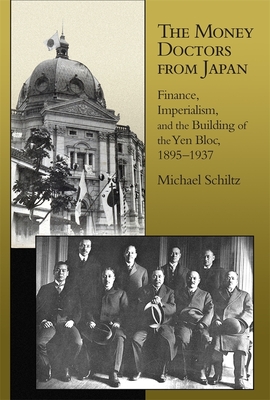

 Harvard University Press
Harvard University Press
The Money Doctors from Japan: Finance, Imperialism, and the Building of the Yen Bloc, 1895-1937


Key Metrics
- Michael Schiltz
- Harvard University Press
- Hardcover
- 9780674062498
- 9.2 X 6.3 X 1.1 inches
- 1.25 pounds
- History > Asia - Japan
- English
 Secure Transaction
Secure TransactionBook Description
Money and finance have been among the most potent tools of colonial power. This study investigates the Japanese experiment with financial imperialism--or yen diplomacy--at several key moments between the acquisition of Taiwan in 1895 and the outbreak of the Sino-Japanese War in 1937. Through authoritarian monetary reforms and lending schemes, government officials and financial middlemen served as money doctors who steered capital and expertise to Japanese official and semi-official colonies in Taiwan, Korea, China, and Manchuria.
Michael Schiltz points to the paradox of acute capital shortages within the Japan's domestic economy and aggressive capital exports to its colonial possessions as the inevitable but ultimately disastrous outcome of the Japanese government's goal to exercise macroeconomic control over greater East Asia and establish a self-sufficient yen bloc. Through their efforts to implement their policies and contribute to the expansion of the Japanese empire, the money doctors brought to the colonies a series of banking institutions and a corollary capitalist ethos, which would all have a formidable impact on the development of the receiving countries, eventually affecting their geopolitical position in the postcolonial world.
Author Bio
As a financial historian, I am fascinated by the ways in which money and finance have made modern society tick, especially since the ‘first globalization’ (1870-1914), a period that coincides with the proliferation of the gold standard on a global scale. Of particular interest to me are are the so-called network effects that are innate to currencies when it comes to their role as means of settling international trade.
As we know from the historical record, network effects produce and reproduce center-periphery constellations with strong consequences for the way both center and periphery come to terms with more or less identical problems. This center-periphery dynamic was the crux of my first book project on imperial Japan’s definition of monetary regimes in the empire’s own periphery (Taiwan, Korea, Northeast China and Manchuria). It also figures strongly in my second, now completed, book project on the managing practice within the country’s semi-national exchange bank, the Yokohama Specie Bank. In charge of boosting Japanese trade with both the world’s leading economic powerhouses and the Asian Hinterland, its bankers were profoundly aware of the schisms between the former and the latter.
As the book demonstrates, it defined the bank’s role and evolution in the steadily expanding Japanese influence on the Asian mainland.
I also have a not so secret double-life as an explorer of the digital revolution for scientific practice and communication. The latter has come to have a direct impact on my own research and teaching. I chose to document both through non-conventional means as e.g. twitter (@michaelschiltz) and GitHub (https://github.com/michaelschiltz)
In my classes, the multilingual aspect is key. It is very refreshing when different students engage with primary and secondary sources in Japanese, English, Chinese, Korean, etc. Both Japanese and non-Japanese students are warmly invited to participate in my courses. As the era in which we live has made the consultation of primary sources both practical and desirable, they will form the basis of presentations and discussions. Last, I tend to organize my classes in a very open, nonhierarchical way. Learning should be a fun and gratifying experience!
Source: Hokkaido University's Modern Japanese Studies Program
Videos
No Videos
Community reviews
Write a ReviewNo Community reviews